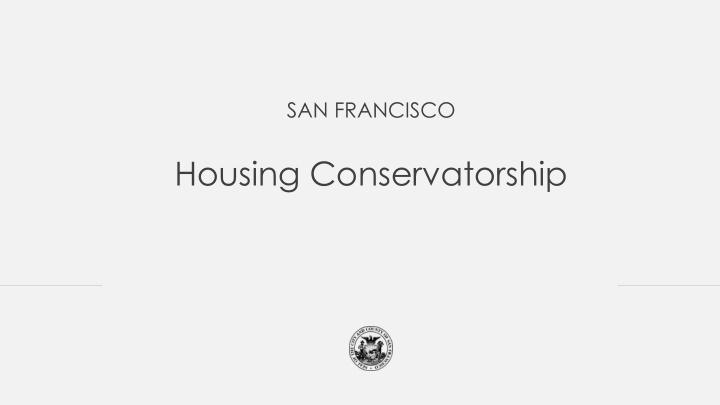



SAN FRANCISCO Housing Conservatorship
Overview of Housing Conservatorship Current Landscape • Methamphetamine and opioid epidemic. • Vulnerable individuals who are unable to care for themselves due to a combination of serious mental health AND substance use disorder that cycle in and out of crisis. Challenges • Ineligible for traditional involuntary or court ordered treatment options. Tools to Address the Gap • San Francisco has a history of innovation to expand and adapt our care to meet the needs of our population. 2 Housing Conservatorship Working Group November 1, 2019
Cycle of Acute Mental Illness and Substance Use 3 Housing Conservatorship Working Group November 1, 2019
History ▪ September 2018- SB1045 signed by Governor ▪ June 2019- SB1045 adopted by San Francisco Board of Supervisors ▪ October 2019- SB 40 signed by Governor 4 Housing Conservatorship Working Group November 1, 2019
Population Served Housing Conservatorship is designed to help individuals (estimated to be 50- 100 individuals that are eligible): ▪ who cycle in and out of crisis; ▪ are incapable of caring for health and well being; ▪ have refused multiple offers of voluntary services; ▪ Are not eligible for other existing programs (e.g., AOT, LPS). 5 Housing Conservatorship Working Group November 1, 2019
Eligibility Criteria 1. Be at least 18 years of age; 2. Be diagnosed with a serious mental illness as defined by law (WIC 5452(e)); 3. Be diagnosed with a substance use disorder as defined by law (WIC 5452(f)); 4. As a result of (2) and (3), the individual has functional impairments or a psychiatric history demonstrating that without treatment it is more likely than not that the person will decompensate to functional impairment in the near future; 5. Be incapable of caring for their own health and well-being due to a serious mental illness and substance use disorder; 6. Have eight or more 5150 detentions in a 12-month period; 7. Have been provided with opportunities to engage in voluntary treatment; 8. Assisted Outpatient Treatment has been determined to be insufficient or, as a matter of law, the individual does not meet the criteria for Assisted Outpatient Treatment; 9. Conservatorship is the least restrictive option for the protection of the individual. 6 Housing Conservatorship Working Group November 1, 2019
Referral Source for Evaluation 1. Sheriff or designee 2. Director of Health or designee 3. Director of the Human Services Agency or designees 4. Directors of agencies that provide comprehensive evaluation or facilities that provide intensive treatment – such as hospitals that perform psychiatric evaluations 7 Housing Conservatorship Working Group November 1, 2019
Patient’s Rights ▪ Strict eligibility criteria ▪ Multiple opportunities to engage in voluntary services prior to referral o Engagement by AOT Team (including Patient’s Rights handout) o Offer of voluntary services at each 5150 WIC ▪ Due process protections o Multiple notices of potential path towards conservatorship o Court oversight o Right to hearings/jury trial o Representation by Public Defender 8 Housing Conservatorship Working Group November 1, 2019
Conservatorship ▪ Temporary Conservatorship ▪ Lasts up to 6 months (may be renewed) ▪ No involuntary medication order ▪ Due process protections o Multiple notices of potential path towards conservatorship o Court oversight o Right to hearings/jury trial o Representation by Public Defender 9 Housing Conservatorship Working Group November 1, 2019
Treatment ▪ Individualized treatment plan ▪ Least restrictive setting ▪ Wrap- around services ▪ Principles of treatment: o Recovery and wellness o Trauma informed o Gender responsive o Cultural and racial humility ▪ Permanent housing 10 Housing Conservatorship Working Group November 1, 2019
Information Sharing and Engagement Email: Housing.Conservatorship-Workgroup@sfdph.org Website Updates: www.sfdph.org/dph/comupg/knowlcol/housingconserv/default.asp Housing Conservatorship Working Group November 1, 2019
Recommend
More recommend